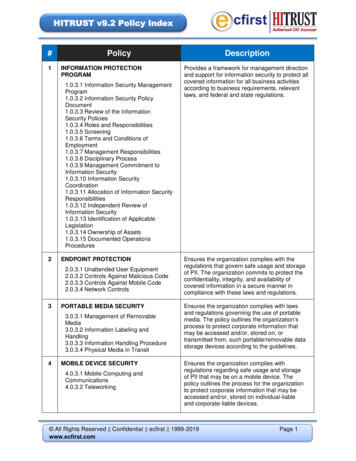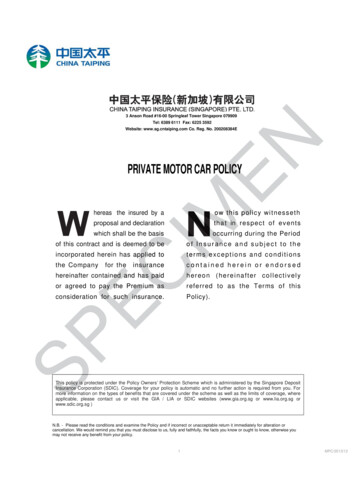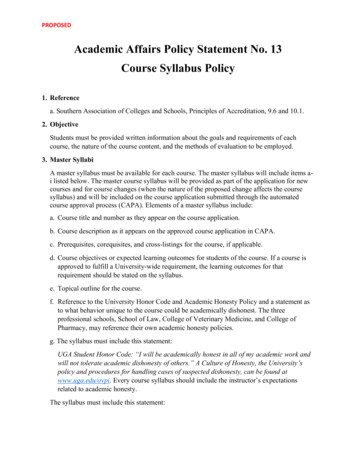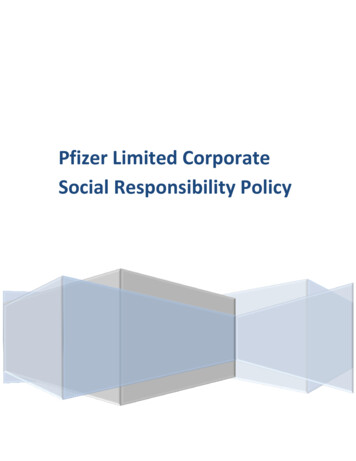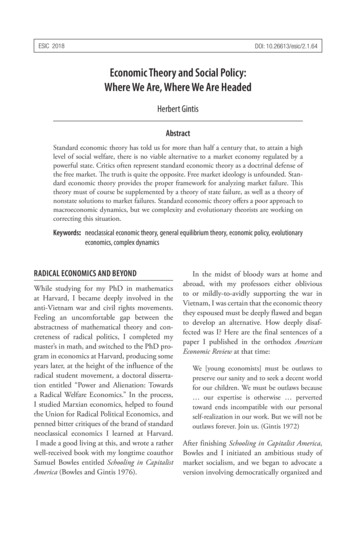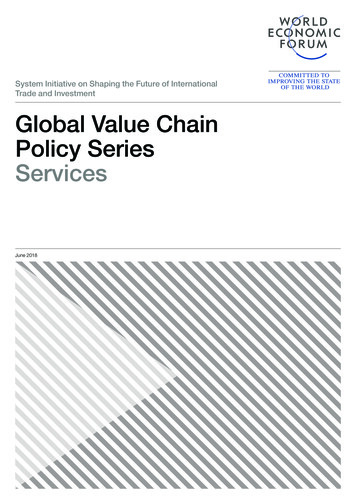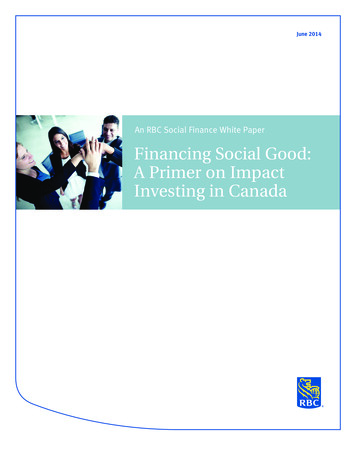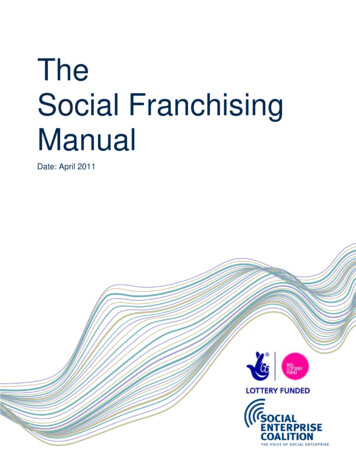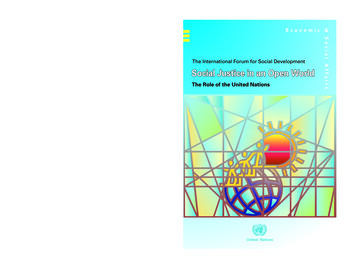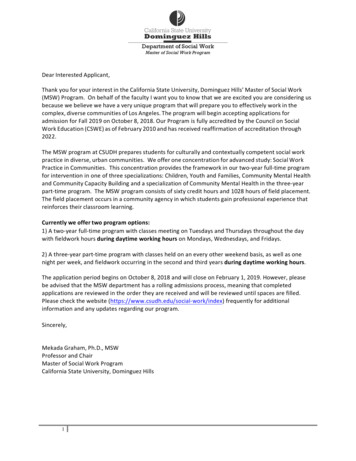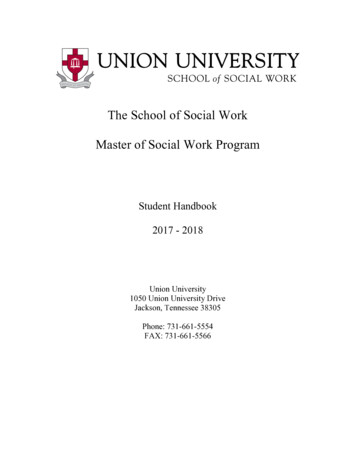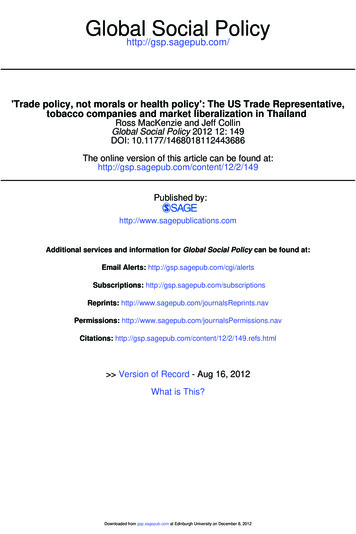
Transcription
GlobalSocial Policyhttp://gsp.sagepub.com/'Trade policy, not morals or health policy': The US Trade Representative,tobacco companies and market liberalization in ThailandRoss MacKenzie and Jeff CollinGlobal Social Policy 2012 12: 149DOI: 10.1177/1468018112443686The online version of this article can be found d by:http://www.sagepublications.comAdditional services and information for Global Social Policy can be found at:Email Alerts: http://gsp.sagepub.com/cgi/alertsSubscriptions: http://gsp.sagepub.com/subscriptionsReprints: ions: tions: http://gsp.sagepub.com/content/12/2/149.refs.html Version of Record - Aug 16, 2012What is This?Downloaded from gsp.sagepub.com at Edinburgh University on December 8, 2012
gspArticle‘Trade policy, not morals orhealth policy’:The US TradeRepresentative, tobaccocompanies and marketliberalization in ThailandGlobal Social Policy12(2) 149 –172 The Author(s) 2012Reprints and I: 10.1177/1468018112443686gsp.sagepub.comRoss MacKenzieMacquarie University, AustraliaJeff CollinUniversity of Edinburgh, UKAbstractThe enforced opening of Thailand’s cigarette market to imports in 1990 has become acause celebre in debates about the social and health impacts of trade agreements. At theinstigation of leading US-based cigarette manufacturers, the US Trade Representative(USTR) threatened trade sanctions against Thailand to compel the government toliberalize its domestic cigarette market. Thailand’s challenge to the USTR led to referralto General Agreement on Tariffs and Trade (GATT) arbitration. While GATT ruled infavour of the USTR on market access, it also found that Thailand could subsequentlyenact non-discriminatory tobacco control regulation without contravening the GATTagreement. This article contributes to existing literature via its analysis of tobaccoindustry documents that highlight not only USTR responsiveness to lobbying fromtobacco corporations, raising concerns about the drivers of globalization and thelimited protection afforded to public health concerns in trade agreements. Significantly,the documents also indicate that USTR support of the tobacco industry was notunconditional, being subject to wider pressures of global trade negotiations. Suchqualification notwithstanding, however, ongoing governmental willingness to advancethe international interests of tobacco corporations remains a concern from a publichealth perspective, particularly given the failure of the US to ratify the World HealthOrganization’s Framework Convention on Tobacco Control.Corresponding author:Ross MacKenzie, Department of Environment and Geography, Faculty of Science, Macquarie University,Sydney, NSW 2019, AustraliaEmail: ross.mackenzie@mq.edu.auDownloaded from gsp.sagepub.com at Edinburgh University on December 8, 2012
150Global Social Policy 12(2)KeywordsBilateral trade agreements, FCTC, globalization, Thailand, tobacco industry, tradeliberalization, USCEA, USTRIntroductionIncreasing tobacco consumption and associated mortality in developing countries(Mathers and Loncar, 2006) reflect the dramatic global expansion of transnational tobaccocorporations (TTCs) in recent decades. This shift has been driven by trade liberalization(Chaloupka and Nair, 2000; Taylor et al., 2000), the privatization of state-run tobaccomonopolies (Gilmore et al., 2009) and by the active support of ‘home’ governments in theUS and UK (Durbin and Waxman, 2003; US GAO, 2003b).The dispute over access to Thailand’s tobacco market represents a particularly significant case study of trade liberalization and the expansion of TTCs. At the instigation ofleading US-based cigarette manufacturers the US Trade Representative (USTR) threatened trade sanctions under Section 301 of the 1974 Trade Act against four Asian countries in the 1980s if they failed to remove import restrictions on tobacco products.Gaining access to the markets of Japan (Lambert et al., 2004), South Korea and Taiwan(Wen et al., 2005) was achieved comparatively easily. Thailand, however, mounted asubstantive challenge to the USTR (Chaloupka and Laixuthai, 1996) that was ultimatelyreferred to General Agreement on Tariffs and Trade (GATT) arbitration.Thailand based its opposition on GATT’s health exemption proviso, Article XX(b)(GATT, 1990), arguing that cigarette consumption would increase if the market wereopened to imports and thereby constituted a risk to public health. This strategy requireddemonstration that market restrictions were both necessary to prevent increased smoking prevalence, and were the least restrictive option available (Eckhardt, 2002). TheGATT panel rejected Thailand’s claims, ruling that existing restrictions violated nondiscrimination obligations under the agreement. Crucially however, the panel also ruledthat comprehensive tobacco control legislation was permissible if applied in a nondiscriminatory manner to foreign and domestic manufacturers (GATT, 1990), andallowed that excise tax and import duty could be levied on imported cigarettes.The politics of the dispute have been analysed (Chitanondh, 2001; Vateesatokit,2003), its implications for international tobacco control contested (Bettcher and Shapiro,2001; Callard et al., 2001) and the case has become an oft-cited cause celebre in broaderdebates about the social and health impacts of trade agreements (Taylor et al., 2000;Trebilcock and Howse, 1999; WHO and WTO, 2002). The public availability of tobaccoindustry documents offers a unique opportunity to re-examine the dynamics of this keydispute. The documents allow for a detailed analysis of USCEA (United States CigaretteExport Association) strategies to lobby support in Washington and overseas, and tocounter health-based opposition to market liberalization that included well-organizedcampaigns aimed at reassuring politicians and the public, and its strategic use of both inpresenting its case to the US and Southeast Asian media.Particularly significant in this context is that while confirming the previously assertedclose relationship between the US tobacco industry and the USTR, material contained inthe documents demonstrates that the dynamics of that relationship are more complexDownloaded from gsp.sagepub.com at Edinburgh University on December 8, 2012
MacKenzie and Collin151than previously supposed. As the dispute progressed, USTR support for industrypreferences became qualified, and the USTR decision to refer it to GATT adjudicationwas (contrary to previous understanding) strenuously opposed by tobacco companies.This demonstration of the industry’s determination to avoid recourse to multilateral adjudication, and clear preference to pursue their global goals via bilateral negotiations hasimportant implications not only for understanding the dispute itself but for contemporarydebates. Whereas to date debates about the compatibility of trade liberalization andtobacco control have centred primarily on the extent of public health protections affordedvia World Trade Organization (WTO) agreements, particularly in the context of negotiating the World Health Organization’s (WHO) Framework Convention on Tobacco Control(FCTC), this analysis highlights the potential value to tobacco companies of proliferatingbilateral agreements that can undermine such flexibilities.MethodsThis article is based on analysis of previously confidential internal tobacco industry documents, made publicly accessible through litigation, and available electronically via theLegacy Tobacco Documents Library. The provenance, mechanics and limitations of usingtobacco industry documents have been described elsewhere (Carter, 2005; MacKenzieet al., 2003). Document research for this article employed an iterative search model inwhich initial use of broad terms and phrases, Thailand, market opening, trade barriers,USTR, USCEA for example, led to more specific searches using names of company personnel and political figures in Thailand and the US. Analysis incorporated validationtechniques within a hermeneutic process (Forster, 1994), and corroboration of interpretation between authors was particularly significant. Secondary research included reviews oftobacco industry publications, NGO reports and newspaper archives.ResultsOpening the monopoly markets of Southeast AsiaHaving moved into Latin America in the 1950s (Shepherd, 1985), US cigarette manufacturers turned to the potentially hugely lucrative Asian markets during the 1970s aspart of their ongoing global expansion (Campaign, 2001; Yach and Bettcher, 2000).Responding to the ‘unique challenges’ (Philip Morris Asia, 1989) presented by importrestrictions in a number of Southeast Asian markets, leading US tobacco companiesformed the United States Cigarette Export Association (USCEA) in 1981 (Frankel,1996) to represent their interests. Philip Morris (PM), the driving force behind the organization (BAT, 1993), was joined by RJ Reynolds (RJR) and Brown & Williamson(B&W); the combined output of the three companies accounted for almost 99% of UStobacco exports (US GAO, 1992). The USCEA’s specific remit was to lobby the USgovernment for elimination of regional restrictions on imported tobacco products(Frankel, 1996), and to insulate US manufacturers from domestic advertising bans andother tobacco control regulations once market access was achieved (The Economist,1992). Significantly, the USCEA was formed amid growing US trade deficits with theDownloaded from gsp.sagepub.com at Edinburgh University on December 8, 2012
152Global Social Policy 12(2)countries targeted, which created a favourable political climate in which to highlighttobacco’s prominence as ‘one of only four product categories for which America showsa trade surplus’ (USCEA, n.d.). Association lobbyists also claimed that access to markets in Southeast Asia would generate considerable income (USCEA, 1990) and lead todomestic job creation (USCEA, n.d.).In 1985 and 1986, USCEA appeals to the Reagan administration concerning importrestrictions in Japan and Taiwan were referred to the USTR, an executive branch agencyresponsible for US bilateral and multilateral trade policy. The agency has substantialautonomy under Section 301 of the 1974 Trade Act, and is distinctive in being whollyunder executive branch control, authorizing either the president or the USTR to identifyrestrictions on US imports, demand negotiations for their removal and impose retaliatorytrade sanctions against offending countries (Sherman, 2002). When the USCEA latersought USTR assistance in challenging closed markets in Korea in 1988, and Thailand in1989, it petitioned the USTR directly (Chaloupka and Corbett, 1998), suggesting development of close links between the two organizations. A 1990 US General AccountingOffice (GAO) report detailed such connections between senior executives of USCEAmember companies and government officials, and found that the cigarette manufacturershad offered market and technical information to trade negotiators, and employed ‘formersenior White House officials as consultants to promote their interests in Taiwan andKorea’ (US GAO, 1990).From 1985 to 1989, the USTR was headed by Clayton Yeutter, whose career reflectsthe close links between the agency, the US Republican Party and the tobacco industry.Having served in various offices under four presidents, Yeutter was chairman of theRepublican National Committee from 1991 to 1992 (Hogan and Hartson, 2009), andbecome a non-executive director of BAT (British American Tobacco) in 1993 (AsianDevelopment Bank, 2004; BAT, 1994). Under his leadership the USTR adopted a firmline in negotiations. Citing the operation of state tobacco monopolies in countriestargeted by his agency, Yeutter dismissed public health justifications made for importrestrictions on cigarettes:. . . when a nation violates its international trade obligations by restricting tobacco importswhile allowing domestic sales, that constitutes discrimination against United States products.We have an obligation under the law to attack such discrimination, and we intend to do so – nomatter the product. (USCEA, 1989a)Turning to the Thai marketThailand’s tobacco market has long been dominated by the Thailand Tobacco Monopoly(TTM). Formed in 1939 and granted monopoly control four years later, the TTM remainsa consistently profitable enterprise for the Ministry of Finance (Thailand MoF, 2009).TTC attempts to enter Thailand through joint ventures and licensing agreements in theearly 1980s (Norsworthy, 1983; Scott, 1988; Snyder, 1987) followed indications fromwithin some government ministries that the monopoly was to be included in privatizationprogrammes (Norsworthy, 1988). An agreement reached between the USTR and theDownloaded from gsp.sagepub.com at Edinburgh University on December 8, 2012
MacKenzie and Collin153MoF to drop restrictions on US cigarettes imports, following confidential negotiations,was withdrawn in March 1989 after complaints by the National Committee for theControl of Tobacco Use and the Thai Anti-Smoking Campaign Project, a prominentNGO (Vateesatokit, 2003).Subsequent inability to access the Thai market left the USCEA with ‘no choice butto ask for U.S. Government assistance’ (USCEA, 1989a), and representativesapproached the USTR to initiate proceedings against Thailand in April 1989. CarlaHills had replaced Yeutter, and reiterated her predecessor’s position that Thailand’srestrictions were aimed at protecting its monopoly rather than protecting public health(Frankel, 1996).The USCEA specifically petitioned US negotiators to accept only:. . . bona fide market access which feature [sic] the following pre-conditions:a) No manufacturer quotas.b) Independent distribution at individual manufacturers choice.c) Revised cigarette taxes that allow tax paid imports to be price competitive with contraband.(Jilla, 1989)Its case rested on three economic planks: income generated by the opening of theJapanese, Korean and Taiwanese markets was estimated to have reached US 1 billionannually (USCEA, 1990); tobacco’s positive trade balance – particularly significantgiven Thailand’s annual US 2 billion trade surplus with the US (USCEA, n.d.); andassociated domestic job creation (Frankel, 1989). The USCEA also depicted its challenge to Thai trade policy as a test of US commitment to free market values, andAssociation president Owen Smith warned in September 1989 that those opposed tothe USTR’s actions in Thailand would ‘provide foreign protectionist lobbies and enemies of free enterprise with additional pretexts for protectionist action and retaliationagainst U.S. producers and manufacturers’ (USCEA, 1989b). Similar sentiments werevoiced by the former Democratic senator from Kentucky Walter Huddleston whodescribed Thailand as the ‘only major country in the non-communist world (apartfrom Iran and Syria) that does not allow the sale of American brands of cigarettes’(USCEA, 1990).USCEA members expected a swift and positive conclusion to negotiations withThailand, given the resolution of the earlier 301 actions in the region. PM business projections for a liberated Thai market indicated that the country’s economic expansion andgrowing middle class would lead to ‘a substantial market for a range of American consumer goods’ (Philip Morris, 1990), and company officials were confident that theTTM’s dominance would quickly dissipate given the monopoly’s inefficient productionmethods (Philip Morris, 1990), which were attributed to the strength of the monopoly’sworkers’ union (Wichers, 1987), a poor distribution network and limited marketingcapacity and expertise (Altizer, 1989).Downloaded from gsp.sagepub.com at Edinburgh University on December 8, 2012
154Global Social Policy 12(2)Political support for US tobacco corporationsIndustry documents indicate that the USCEA, PM in particular, was consistently able tomobilize a powerful support network that encompassed Washington, US governmentofficials overseas and sections of the Thai business community. Andrew Whist, vicepresident of corporate affairs at Philip Morris International (PMI) reported in 1986 that:Staff from Hong Kong and New York worked closely and cooperatively with the WashingtonOffice in developing new strategies on trade issues and market access, strengthening ourrelationship with the U.S. Government, particularly with the United States Trade Representative’sOffice (USTR). The outcome will greatly enhance our business in Asia. (Whist, 1986)In 1990, US vice president Dan Quayle declared that ‘Tobacco exports should beexpanded aggressively, because Americans are smoking less’ (The Economist, 1992).Other high profile Republican backers included Robert Dole, Republican senator forKansas and 1996 presidential candidate (Frankel, 1996); John Block, Secretary of theDepartment of Agriculture in the Reagan administration (USCEA, 1989b); tobacco beltsenators Mitch McConnell of Kentucky (USCEA, 1990); and Jesse Helms of NorthCarolina (Frankel, 1996). During 301 talks with Japan, Helms had written to primeminister Yasuhiro Nakasone to recommend that ‘friends in Congress will have a betterchance to stem the tide of anti-Japanese sentiment if and when they can cite tangibleexamples of your doors being opened to American products’, and suggested a goal of20% market share for US cigarettes within 18 months (The Economist, 1992).The recruitment of Howard Baker – former Senate majority leader, Chief of Staffunder Ronald Reagan and, later, US ambassador to Japan – was particularly significantto PM’s international strategy. In June 1989, Jim Dyer of PM Management Corporationinformed colleagues that Baker had completed ‘his one year “cooling off” period’ afterleaving elected office, and would ‘begin to play a more active role in our governmentaffairs programs’ (Dyer, 1989b). Baker’s anticipated value as ‘an effective high leveladvocate of our policies’ was based on his contacts within the Bush administration,Congress, the media and the business community, which allowed him ‘access that fewWashingtonians can ever hope to achieve’ (Dyer, 1989b).A series of dinners co-hosted by Baker and PM president and CEO Hamish Maxwellin late 1989 were described by Dyer as ‘the long awaited opportunity to use SenatorBaker’s considerable talents on behalf of Philip Morris’ (Dyer, 1989a). These meetingswith leading political figures were organized to ‘develop personal contacts, to demonstrate our good will and our citizenship, to promote their understanding of our needs’(Dyer, 1989a), and included Bob Mosbacher, Secretary of Commerce from 1989 to1992, and the USTR’s Carla Hills. Mosbacher was described as potentially a ‘powerfulally very close to the President who can assist with any of our international activities’while the meeting with Hills would allow PM ‘to address any needs we have internationally, specifically with Thailand’ (Dyer, 1989a). Other guests included ClaytonYeutter, members of the Senate Finance Committee and ‘other targets of opportunity’such as Robert and Elizabeth Dole (Dyer, 1989a).The USCEA was also able to attract considerable bipartisan support. Key Democratbackers included Al Gore (Frankel, 1996), former Democratic congressman and senatorDownloaded from gsp.sagepub.com at Edinburgh University on December 8, 2012
MacKenzie and Collin155for Tennessee, vice president and presidential candidate; former Texas governor AnnRichards; and George Mitchell, former Senate majority leader and special envoy toIreland and later, to the Mideast (Public Citizen, 1998; Torry, 1998). Both Richards andMitchell later worked as tobacco industry lobbyists for Washington, DC law firm, Verner,Liipfert, Bernhard, McPherson and Hand (Torry, 1998). Other Democrat supportersincluded Huddleston, noted above, and congressman Robin Tallon from South Carolina(USCEA,
a trade surplus’ (USCEA, n.d.). Association lobbyists also claimed that access to mar-kets in Southeast Asia would generate considerable income (USCEA, 1990) and lead to domestic job creation (USCEA, n.d.). In 1985 and 1986, USCEA
